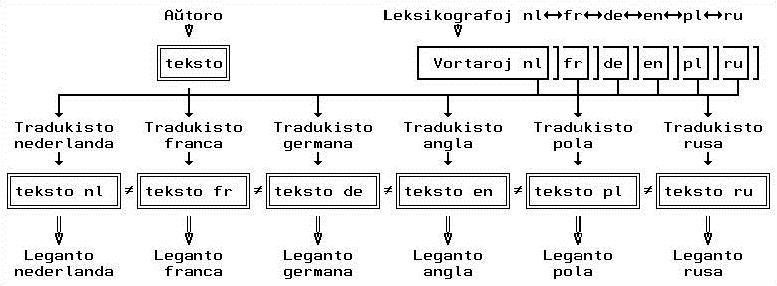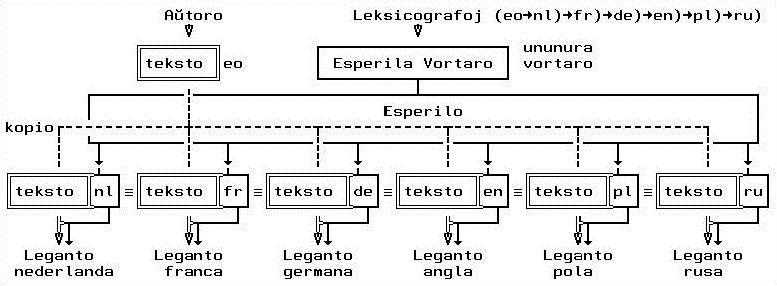
*

A
4 etapoj por transsendi penson
Verkado, Transdukto,
Legado, Transdedukto
1. Altraduko
La aŭtoro verkas en
sia lingvo, sed ĝi ne povas antaŭvidi kiajn vortarojn
estas konsultitaj de la tradukistoj, nek se ili havigos de tiuj
vortoj tradukon kiu kongruas kun sia penso.
B
1. Verkado
La aŭtoro verkas sian
tekston en Esperanto elektante en la Esperila vortaro la vortojn,
kies vorteroj (eroj de la vorto) plej bone tradukas sian penson.
2. Traduko
Ĉiu tradukisto reskribas
kion li komprenis el la penso de la aŭtoro en teksto tradukita
en la lingvon de la leganto, aldonante notojn kiuj kompletigas
tiun transponon.
C
2. Transdukto
De ĉiun eron de vorto
el la teksto, Esperilo videbligas tradukon de la vortero en la
lingvo de la leganto, kiel la leksikografoj antaŭvidis tion
en la vortaro.
D
3. Legado
La komputilo vidigas tiujn
tradukojn laŭ piednotoj, kiujn esploras la leganto
en sia lingvo kien tio necesas.
3. Detraduko
Ĉiu leganto rekreas la
penson de sia tradukisto ekde la teksto tradukita en sian lingvon.
Li povas nur imagi la penson de la aŭtoro.
E
4. Transdedukto
Sen traduki la tekston
en sian lingvon, la leganto rekreas la penson de la aŭtoro
enkontakte kun la originala teksto kaj kun la piednotoj,
kiuj li esploras en sia lingvo.
F
Ĉiu leksikografo inspiriĝas el la
aŭtoroj kaj el aliaj lingvaj vortaroj.
Ili tradukas
samtempe unu lingvon nur en unu alian.
Ĉi-tie la
leksikografio estas je la servo de la tradukistoj kaj de la
lingvistoj.
G
Ĉiu leksikografo povas inspiriĝi el la
traduko de vortero en aliaj lingvoj por plibonigi sian propran
tradukon kaj iĝi ĝin pli konforma al la aliaj.
Ĉi-tie
la leksikografo estas je la servo de la aŭtoroj kaj de la
legantoj.
Plibonigo de la traduko sugestita de aŭtoro aŭ de leganto povas malfacile esti aplikitaj al jam tradukitaj tekstoj ; en la plej bona okazo ĝi plibonigos nur verkon tradukitan en tiun lingvon. Plibonigo de vortaro efikas nur por la tradukoj, kiuj estos faritaj post ĝia reeldono.
H
Ĉiu plibonigo de la tradukado de vortero povas esti aplikata senprobleme sine de ĉiuj tekstoj prilaboritaj de Esperilo, eĉ antaŭaj. Aplikado de tiu korektado povos esti farita sisteme sen nova kontrolo de la aŭtoro.
La aŭtoro devas skribi sian tekston en lingvo konata de ĉiuj tradukistoj kaj li ne povas antaŭvidi kiamaniere ili komprenos kaj tradukos ĝin.
I
La aŭtoro povas konsulti la Esperilan vortaron kaj scii precize la tradukojn, kiuj estos proponitaj al la legantoj. Sekve li povas antaŭvidi la efikojn de siaj elektoj en ĉiu el la lingvoj, kiujn li konas.
Eble pluraj tradukistoj tradukos malsame la tekstojn
Sama tradukisto povas traduki parton de la teksto malsame ol alia parto, kies memoron li ne plu havas en sia menso.
La qualité de sa traduction varie d'un instant à l'autre.
J
Esperilo estas centre de tri sendependaj
tradukoj.
Ĉi-tiuj povas esti unuigitaj per trialogo
inter :
1. La leksikografo kiu tradukis ĉiun
vorteron en ĉiun lingvon.
2. La aŭtoro, kiu uzas la
vortojn de tiu vortaro por traduki sian penson en sian tekston.
3.
La leganto, kiu sensas la penson de la aŭtoro de tiu teksto
helpe de la piednotoj.
La tradukisto estas interpretisto inter la aŭtoro kaj la leganto.
K
Esperilo faras neniun tradukon. Sen interpreti
ilin, ĝi transdonas la indikojn, kiujn la leksikografoj notis
en la vortaro.
La transdono estas perfekta : la
transdonita penso atingas la leganton, tiel nedifektita kiel la
kurento konduktita per elektra fadeno.
Ni supozu ke teksto skribita en la lingvo de aŭtoro estu tradukita en lingvon, kiun li ne tute scipovas. La aŭtoro havas neniun senperan kontakton kun la farita traduko, kaj do li ne povas scii, ĉu sia penso estis eble perfidita. Li povas nur fidi la tradukiston aŭ krompersonon, kiu konas la temon kaj la du koncernajn lingvojn. Se fakte li ne havas la kontentigon, kiun li dezirus havi, li povas nenion fari kaj li povas scii nenion el tio, almenaŭ senpere. Li dependas de eventuala kritiko de kompersono kaj de lia nepre necesa helpo por klarigi al la tradukisto la specon de lia korekto.
L
Ni supozu ke teksto skribita en la lingvo de aŭtoro estu tradukita en Esperanton kaj prilaborita de Esperilo. La aŭtoro povas havi kun tiu traduko kontakton tiel senpera kiel alia leganto pere de la piednotoj en sia lingvo. Do li povas scii, ĉu sia penso estis eventuale perfidita, almenaŭ en sia lingvo. Se li estas kontenta tiurilate, aŭtomate li estos trankviligita, koncerne la aliajn lingvojn, kiel la vortaro de Esperilo tradukas sammaniere ĉiun vorteron en la diversaj lingvoj. Se li ne estas kontenta, li povas, propravole, klarigi al la tradukisto la specon de sia korekto.
Estus ege stulte angligi laŭvorte la vortarojn « Larousse » kaj « Robert », ĉar ili klarigas france, por Franclingvanoj, la difinon de francaj vortoj per frazoj skribitaj France. Tia laŭvorta traduko havigus al la angla leganto neniun utilan informon pri la francaj vortoj, pretekste ke ili estis tradukitaj en la anglan, kiel ilian signifon. Tiu sensenca traduko, nura mensopercepto, neniel helpus Anglon por pli bone skribi France.
M
Estus ege prave transdukti anglen, vorteron post vortero, kiun ajn vortaron klarigantan en Esperanto, por esperantistoj, la difinon de esperanto-vortoj per frazoj skribitaj en Esperanto. Tiu laŭvorta transdukto havigos al la angla leganto utilajn informojn pri la vortoj de Esperanto (kvankam ili ne estis tradukitaj) kaj pri ilia signifo (komprenita pere de ili transdedukto) kaj helpus lin por pli bone legi kaj skribi Esperanto- tekstoj.
Laŭ tradukoficejo, doni tekston por traduki ĝin temas nur pri fideco, ĉar estos via fremda kliento, kiu plej bone kapablos taksi la kvaliton de la traduko.
N
Esperilo, al kiu vi donas tekston en Esperanto por transdukti ĝin, havigas implice fidecan respondon, ĉar estas vi mem, kiu taksas en via lingvo la kvaliton de la transdedukto proponita al iuj legantoj.
La principo de tradukisto, kvalita traduko estas teksto, kiu ne pensigas la leganton ke temas pri traduko.
O
La komputiko de Esperilo certigas la kvaliton de la transdukto de teksto, kiu montras al la leganto ke temas pri transdedukto.